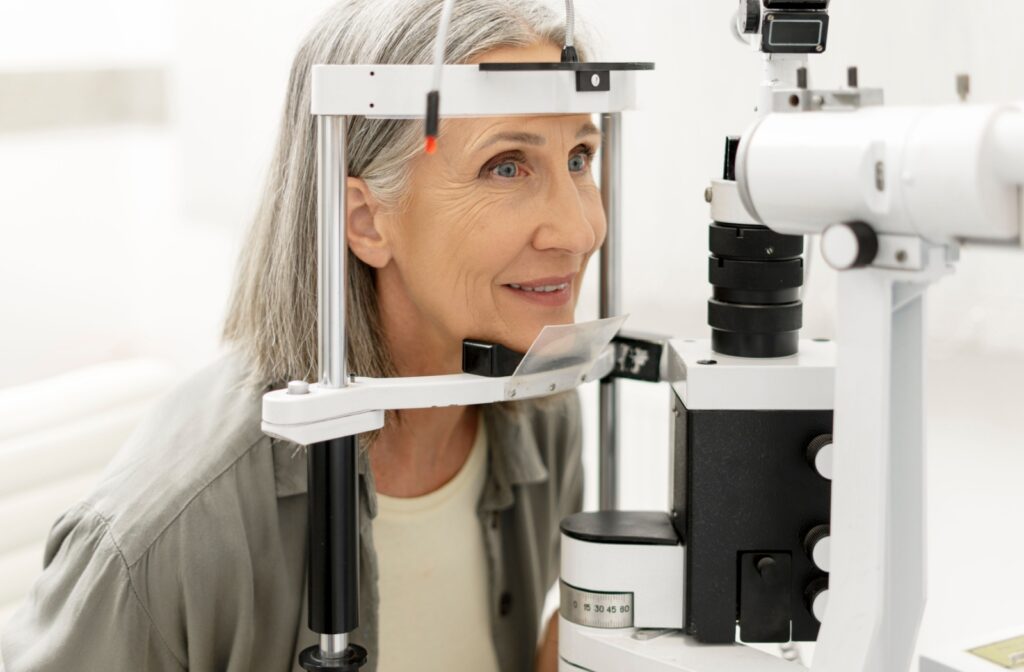An eye exam does more than determine whether you need glasses or contacts—it can offer early clues about your overall health. In particular, comprehensive eye exams can help detect early signs of diabetes, sometimes before noticeable symptoms arise.
Through careful examination of the retina and its surrounding blood vessels, optometrists can detect subtle changes that may indicate diabetes-related complications. Regular eye exams are not just for your eyesight, but an essential part of proactive healthcare, particularly for those who manage or are at risk for chronic conditions such as diabetes.
How the Eyes Reflect Overall Health
The eyes are one of the few places in the body where blood vessels can be seen directly. This makes them a valuable diagnostic tool for monitoring systemic conditions. When blood sugar levels rise, as they do in diabetes, they can cause visible changes in the blood vessels of the retina, well before other symptoms appear.
Many systemic diseases, including diabetes, can first manifest in the eyes. That’s why eye exams play a dual role: they support vision correction and provide insights into your general health.
What Is Diabetes & How Can It Affect the Eyes?
Diabetes is a long-term condition that affects how your body regulates blood sugar. If the body doesn’t produce enough insulin or doesn’t use it effectively, blood sugar builds up in the bloodstream, potentially damaging various organs, including the eyes.
When blood sugar levels remain high over time, they can damage the delicate vessels in the retina. This may lead to several eye health concerns, especially if not detected early.
How Diabetes Impacts Vision
Elevated blood sugar levels can affect vision in several ways. Common diabetes-related eye conditions can include:
- Diabetic retinopathy, where damaged retinal blood vessels may leak or become blocked, threatening vision over time.
- Macular edema, caused by fluid accumulation in the macula, leading to blurred or distorted central vision.
- Glaucoma, a condition where pressure builds inside the eye, which can damage the optic nerve and affect peripheral vision.
- Cataracts, which develop when the eye’s lens becomes cloudy, often occur earlier and more rapidly in people with diabetes.
Understanding how diabetes affects the eyes can help you recognize potential risks early and take steps to protect your vision over time.
Signs of Diabetic Eye Disease

Diabetic eye conditions often develop slowly, without noticeable early symptoms. That’s why regular eye exams are essential for early detection. As these conditions progress, signs may include:
- Blurry or fluctuating vision
- Dark spots or floaters
- Increased light sensitivity
- Frequent changes in eyeglass prescriptions
- Sudden vision loss in one or both eyes
Noticing changes early gives you the chance to act quickly and protect your long-term vision.
Can an Eye Exam Help Detect Diabetes?
Yes. A comprehensive eye exam can uncover early signs of diabetes by evaluating the retina and surrounding blood vessels for abnormalities.
Your optometrist may detect:
- Small areas of retinal bleeding or swelling
- Changes in blood vessel structure or flow
- Changes in the retina that might indicate swelling or fluid buildup
These signs may prompt your optometrist to recommend follow-up testing with your family doctor or an endocrinologist. Identifying these changes early can support timely care and long-term health.
What Is a Diabetic Eye Exam?
For people with diabetes or at higher risk, a diabetic eye exam is a targeted assessment designed to monitor the early effects of diabetes on the eyes. These exams typically include:
- Retinal imaging that captures detailed pictures of the back of the eye for comparison over time.
- Optical coherence tomography (OCT), a non-invasive scan that shows cross-sections of the retina, helping detect macular swelling or damage.
Even if symptoms aren’t present, this type of exam helps track changes and supports early treatment when needed.
Tips to Help Prevent Diabetic Eye Complications
Whether you have diabetes or are working to reduce your risk, there are steps you can take to protect your eye health:
- Attend regular eye exams to catch early changes before symptoms appear.
- Manage blood sugar levels with the help of your healthcare provider.
- Maintain a healthy lifestyle, including regular exercise and balanced nutrition.
- Quit smoking, which increases the risk of retinal damage.
- Monitor changes in vision and report new symptoms promptly.
Preventive care plays a crucial role in reducing complications and maintaining long-term vision health.
Your Next Step Toward Protecting Vision
Comprehensive eye exams are an essential part of overall health care—especially for those living with or at risk for diabetes. These exams don’t just assess your eyesight; they help uncover silent changes that could impact your health down the road.
Our team at Pinehouse Eyecare offers comprehensive, patient-centred care tailored to support both your vision and overall well-being.
If you’ve noticed changes in your vision or have concerns about diabetes, schedule an eye exam to help detect early signs and protect your long-term health.










